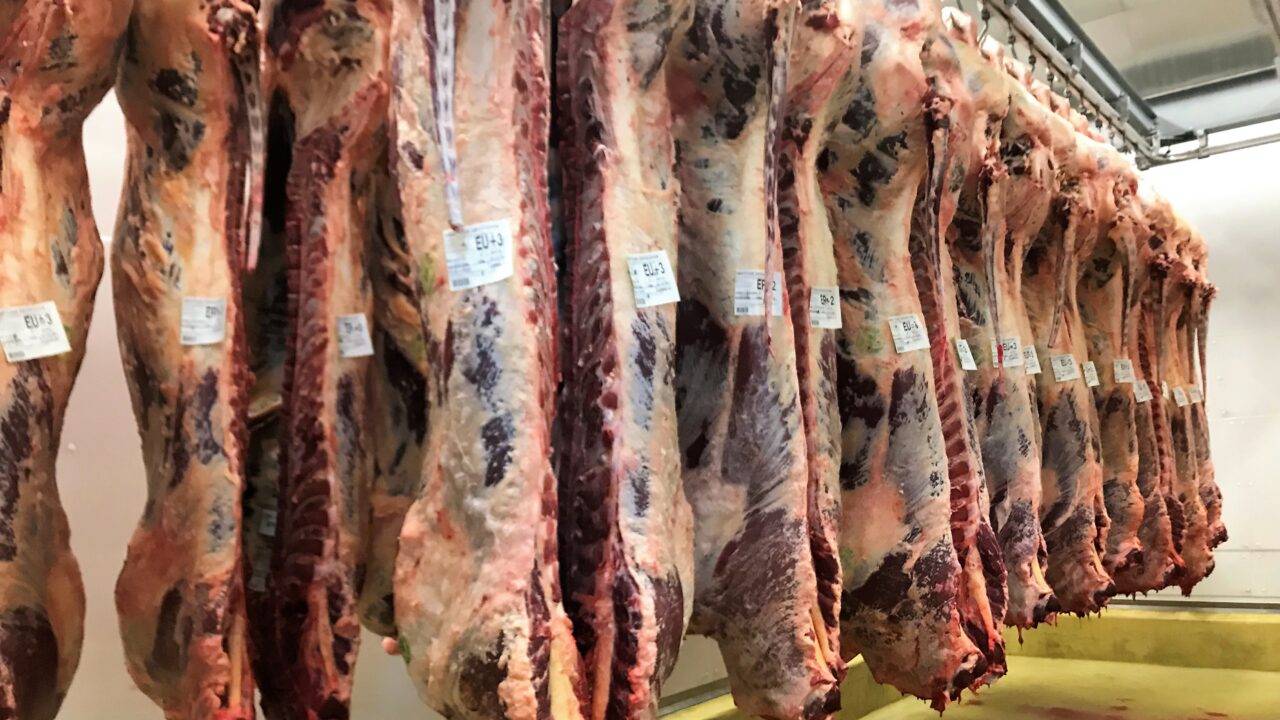The chronic depression that farmers are taking on beef price is not being passed along the food chain, Supermac’s chief Pat McDonagh has stated.
In an interview with AgriLand, McDonagh weighed in on the ongoing independent farmer protest campaign taking place outside the country’s leading processors – despite legal action being taken against a number of individual farmer protesters.
He outlined the need for a specific roadmap for the future of the struggling sector, whilst also highlighting that he would support the extension of the current slaughter age limit from 30 months to 36 months – an industry spec requirement that has been a central sticking point in the standoff to date.
“From an outside point of view farmers are fighting for their livelihoods and their futures, you can’t blame them for doing that.
If prices are the equivalent today as to what they were 15 to 20 years ago, obviously there is something wrong.
“We’re paying the same price for beef as we were 12 months ago and the butcher is charging the same price as he was charging 12 months ago – so it’s not being passed onto the consumer at the end of the day.
“But somebody is making a fortune on it – and that’s what you always have to look for, who is benefiting from this?
“I always feel that the control of the beef industry is in the hands of too few.
“When that happens farmers have, to a degree, lost control of their own future and there is a big danger here that the future of the family farm is at stake,” said McDonagh who buys in an estimated 1,200 tonnes of beef every year for his various food outlets.
Rules or recommendations?
When asked for his take on the possibility of all parties returning to round-table beef sector reform talks – under the auspices of the Minister for Agriculture, Food and the Marine, Michael Creed – McDonagh frankly stated that without addressing price and concerns over “anti-competitive rules” it would be a “waste of time”.
If the price of beef can’t be discussed at these talks then what is the point of going into discussions? It doesn’t make sense.
“What the hell else needs to be discussed? The quality is 100%.
“From my side, extending the slaughter age limit to 36-month-old animals, I certainly wouldn’t have any issue with that whatsoever.
“But, if you can’t discuss these issues then the talks are handicapped,” he said.
Expanding on concerns around the 30-month age limit requirement – originally introduced as one of many measures to manage risk levels associated with Bovine spongiform encephalopathy (BSE), commonly known as ‘mad cow disease’ – McDonagh said it should be reexamined.
That was then, and this was now. And certainly I think 36 months is quite acceptable – provided the Department of Agriculture is happy with the killing process and do all the checks etc.
“It’s more of a recommendation than a law and it is benefiting the factories more so than it is the farmer.
“If the farmer has to sell within 30 months he’s caught in a ‘catch 22’ situation – if the price is so low at that stage what can he do?
“He can’t hold on to them for another six months or a year because the price can deteriorate, so I think that has to be re-looked at.
“There hasn’t been any occasion where ‘mad cow disease’ has cropped up since, and accordingly, 10 or 12 years later, I think they need to reassess the situation with those measures,” he said.
Feedlot fears
Over the course of the last week five processors – Dawn Meats; ABP; Liffey Meats; Slaney Foods; and Kepak – sought temporary High Court injunctions against a number of protesters after contending that certain “illegal” blockades had caused significant disruption on kill lines and they claimed that some protesters had engaged in “intimidating” behaviour towards staff members.
According to Meat Industry Ireland (MII) operations have now been brought to a halt at 12 plants, giving rise to “staff lay-offs and significant losses”.
The situation has also coincided with the visit of an official Chinese delegation that are inspecting 16 processing plants this week with a view to potentially increasing access for Irish beef and sheepmeat in China’s market.
McDonagh says taking legal action against farmers will only serve to “exacerbate” the scenario among the farming community.
“The future of Irish small farms is very much the question here.
“If farmers are not making enough to have a decent livelihood out of it, the next thing is obvious, it will be taken over by bigger operations and eventually go down the road of feedlot farming and factory farming where factories own the farms or contract them out.
If you look at what has happened in America – whether it’s through feedlot farms that have been taken over by bigger companies, or through factory farms or whatever – that’s basically what’s happening here at the minute.
“In all fairness, the best produced beef in Ireland is by small farmers, grass fed, where farmers themselves look after their cattle and sheep on a daily basis – that’s the best beef that’s produced.
“Feedlot farming is not certainly as good. If you have cattle locked up in a feedlot all day, it’s not the healthiest thing in the world either.
“But, I can appreciate that farmers, if they are only getting the same or less than they were 20 years ago, nobody can sustain that.
“It’s a matter for farmers and all stakeholders to decide where is the future for the Irish beef sector and what is needed to correct the situation,” McDonagh concluded.
